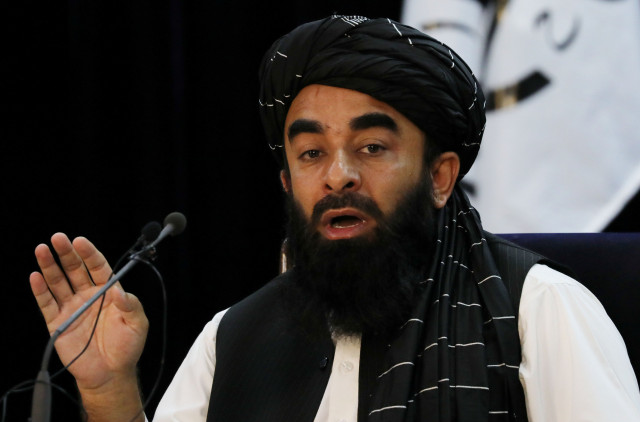The assertion comes a day after three FC members were martyred in a suicide attack in Peshawar, with Islamabad yet to respond
The Afghan Taliban regime accused Pakistan on Tuesday of launching airstrikes on Afghan territory overnight.
In an article on Islamabad is yet to officially respond to this statement.
پاکستانی فوج کی جانب سے ایک بار پھر افغانستان کی فضائی حدود کی خلاف ورزی پر ردعمل
گزشتہ شب پاکستانی فوج کی جانب سے افغانستان کے صوبہ پکتیکا، خوست اور کنڑ میں کی گئے فضائی حملے نہ صرف افغانستان کی خودمختاری اور فضائی حدود کی صریح خلاف ورزی ہیں،
۴/۱— Zabihullah (..ذبـــــیح الله م ) (@Zabehulah_M33) November 25, 2025
The above-mentioned strikes were reportedly carried out on the same day that Federal Police (FC) soldiers repelled several attackers, including a suicide bomber, who attempted to storm their headquarters in Peshawar. At least three paramilitaries were killed and 11 others were injured in the attack.
Pak-Afghan tensions
Talks between Pakistan and Afghanistan in Istanbul have stalled, with no progress on Islamabad’s demand for a concrete plan to dismantle terrorist networks operating from Afghan soil. Despite mediation by Turkish officials, the Taliban delegation refused to provide written guarantees.
A security source said earlier The Express PK Press Club“The logical and reasoned demands presented by Pakistan are legitimate, but the Afghan Taliban delegation is not ready to fully accept them.”
Read: Peace negotiations between Pakistan and Afghanistan at an impasse
“The message from Islamabad was clear: no compromise on terrorism. Pakistan has presented specific proposals aimed at seeking verifiable measures to dismantle the TTP network and prevent cross-border attacks,” another source familiar with the matter said.
Pakistan has since decided to keep its border crossings with Afghanistan closed for an indefinite period, signaling a hardened stance until the Afghan Taliban regime takes “verifiable and irreversible” action against terrorist groups, particularly the TTP.
Officials said The Express PK Press Club that the government had conveyed to Kabul that the crossings would not reopen to trade and commercial activities unless concrete steps were taken to eliminate anti-Pakistan elements operating from Afghan soil.
The border closure, which lasted more than a month, left thousands of trucks and containers stranded on both sides, crippling bilateral trade and the regional transit route.
The crossings remained open only to one-way humanitarian movements, mainly to facilitate the return of Afghan refugees and stranded people.
Learn more: Pakistan, Afghan Taliban reach tentative deal at Istanbul talks
Tensions along the Pak-Afghan border escalated on October 12, when clashes erupted after the Afghan Taliban regime opened unprovoked fire on several locations in Khyber-Pakhtunkhwa (KP) and Balochistan, provoking a swift and forceful response from the Pakistani army, which destroyed several Afghan posts and killed dozens of Afghan soldiers and militants.
“Serious threat”
Earlier this month, Denmark warned the United Nations Security Council (UNSC) of the “serious threat” posed by the banned Tehreek-i-Taliban Pakistan (TTP) in Central and South Asia, saying the group receives “logistical and substantial support from the de facto authorities.”
Speaking as Chair of the Security Council’s ISIL (Daesh) and Al-Qaeda Sanctions Committee, Denmark’s Deputy Permanent Representative Sandra Jensen Landi highlighted the presence of around 6,000 TTP fighters in Afghanistan, responsible for high-profile attacks against Pakistan from Afghan soil.
Also read: “Security first, trade second”: Afghan border to remain closed indefinitely
Landi also noted evolving threats from ISIL, al-Qaeda and their affiliates. ISIL-Khorasan (ISIL-K) in Central and South Asia remains a major concern, with at least 2,000 fighters targeting Afghan authorities, Shiite communities and foreign nationals. Meanwhile, Daesh affiliates in Africa, including ISWAP, have expanded their activities and propaganda.
Pakistan’s Deputy Permanent Representative Usman Jadoon echoed concerns about terrorism from Afghanistan. He highlighted the sacrifices made by Pakistan in the fight against terrorism, reporting over 80,000 casualties and economic losses.
Jadoon stressed that groups such as ISIL-K, TTP and its affiliates, BLA and Majeed Brigade continue to operate under Afghan patronage.
He called for the 1267 sanctions regime to reflect ground realities, calling for objective, transparent and impartial processes for the listing and delisting of individuals and entities.




